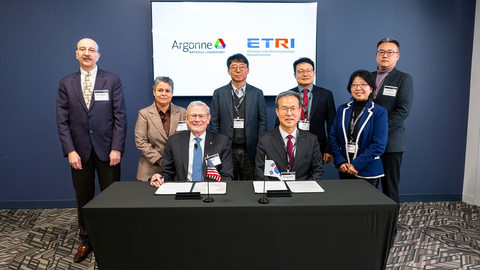The U.S. Department of Energy’s (DOE) Argonne National Laboratory and the Electronics and Telecommunications Research Institute (ETRI), located in the republic of Korea, signed a memorandum of understanding (MOU) on Jan. 6 to collaborate on advancing research in silicon sensors that will help unlock secrets of the universe’s fundamental forces.
This press release features multimedia. View the full release here: https://www.businesswire.com/news/home/20250114763304/en/

Argonne Laboratory Director Paul Kearns (seated, left) and ETRI President Bang Seung Chan (seated, right) signing the MOU. Standing in the second row (from left to right) are Zein-Eddine Meziani and Kawtar Hafidi from Argonne and Baek Yongsoon, Kim Jaiho, Lee Jie Hyun and Jung Dong Yun from ETRI. (Image by Argonne National Laboratory.)
The sensors are being developed for the Electron-Ion Collider (EIC), a cutting-edge particle accelerator being built at DOE’s Brookhaven National Laboratory. The EIC will collide electrons with ions to explore the structure of protons, neutrons and nuclei, shedding light on the forces that hold matter together. The sensors are destined specifically for the Electron-Proton/Ion Collider, the central experimental detector system of the EIC, engineered to precisely track and analyze the interactions resulting from high-energy electron-proton and electron-ion collisions, and enable insights into quantum chromodynamics and the origins of mass.
The goal of the Argonne-ETRI partnership is to foster innovation and academic exchange in cutting-edge scientific fields. Further, the agreement aims to establish a framework to enable more direct collaboration between Republic of Korea research organizations and Argonne.
In a ceremony held on the Argonne campus, the MOU was signed by Laboratory Director Paul Kearns and ETRI President Bang Seung Chan.
ETRI, a leading Ministry of Science and information and communications technology institution and national laboratory located in Daejeon, South Korea, is dedicated to advancing technology and innovation in electronics and telecommunications, contributing to the development of future industries and the improvements to the quality of life.
“We are thrilled to embark on this collaboration with the Electronics and Telecommunications Research Institute,” said Kearns. “This partnership holds immense promise for pushing the boundaries of research in several areas. By combining our expertise, we are poised to drive innovation that will benefit both our nations and humanity in ways we haven’t imagined yet.”
The Electron-Ion Collider, a $3 billion project, represents the highest priority for new facility construction by the DOE Office of Science’s Nuclear Physics division. The collaboration between Argonne and the Republic of Korea focuses on developing and building a novel electromagnetic imaging calorimeter, a key component for identifying scattered electrons essential to studying the quantum structure of protons. This innovative design combines a traditional light-based calorimeter with over 100 square meters of silicon sensors, making it one of the largest silicon detectors ever built.
For the five-year duration of the MOU, Argonne and ETRI will explore various forms of cooperation, including the planning of joint projects and the exchange of scientific information and materials, as well as researchers and specialists. This collaboration is expected to enhance the development of new technologies and methodologies in the field.
Argonne Senior Physicist Zein-Eddine Meziani, a key collaborator on this project, along with Argonne physicists Sylvester Joosten and Maria Żurek, added, “This is a very special time because, given the variety of disciplines that Argonne offers, we will plant the seed on this burgeoning collaboration that we hope will be long-lasting in the U.S., with Argonne as the base.”
View source version on businesswire.com: https://www.businesswire.com/news/home/20250114763304/en/
Contacts
Christopher J. Kramer
Head of Media Relations
Argonne National Laboratory
Office: 630.252.5580
Email: media@anl.gov





